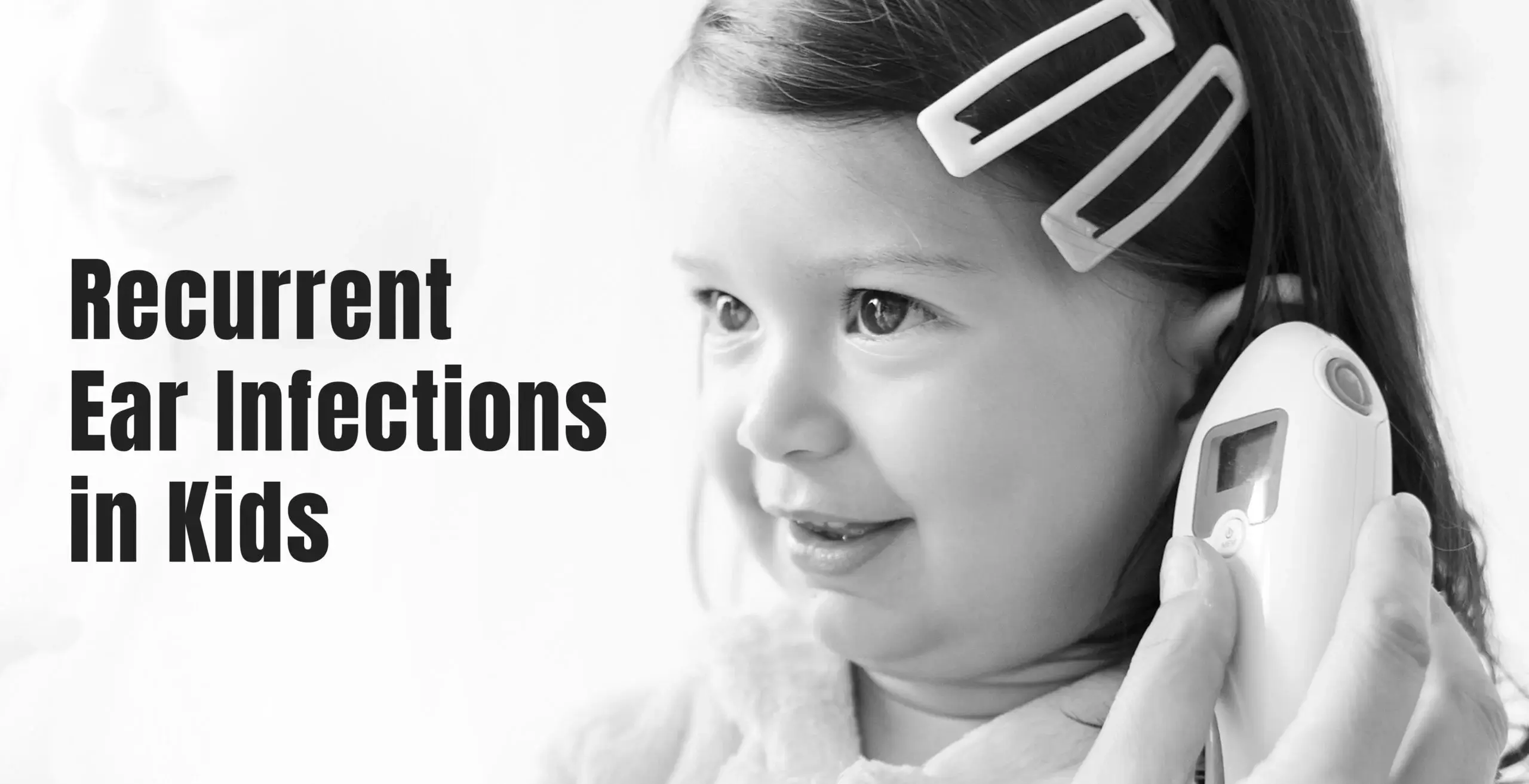Recurrent Ear Infections in Kids

- Overview
- What Are Ear Infections?
- What are Recurrent Ear Infections in Kids?
- Why Do Kids Get Recurrent Ear Infections?
- Common Symptoms of Ear Infections in Kids
- When to See a Doctor?
- How Are Recurrent Ear Infections Diagnosed?
- Recurrent Ear Infection Treatment Options
- Preventing Recurrent Ear Infections in Children
- When Should Parents Worry?
- Conclusion
Summary
Overview
Ear infections in infants are among the most common health issues in children. Experts at the National Institutes of Health (NIH) say that 80% to 90% of children get an ear infection at least once during their childhood.
But when these infections keep coming back, it can become a serious concern for parents. This condition is known as recurrent ear infections. It not only causes pain and discomfort but can also affect your child’s hearing and daily activities. In this blog, we will explain the main causes of repeated ear infections, the common symptoms to watch out for, and the best treatment options available to help your child feel better and stay healthy.
What Are Ear Infections?
An ear infection happens when fluid builds up inside the middle ear, the space behind the eardrum. This fluid can get infected by bacteria or viruses, causing pain, swelling, and sometimes fever. Ear infections are common in children because their immune systems are still growing, and their ear tubes are smaller, which makes it easier for them to get blocked
Dr. Priyanjana Acharya, the best ENT doctor in Gurgaon at Miracles Mediclinic, "Children’s ears are more vulnerable because their Eustachian tubes are smaller and more horizontal, making it easier for germs to get trapped and cause infections."
What are Recurrent Ear Infections in Kids?
When a child gets ear infections frequently, usually defined as three or more infections within six months or four or more within a year, it is called recurrent ear infections. Some kids are more prone to this than others, which means their ear infections come back often despite treatment.
Why Do Kids Get Recurrent Ear Infections?
Several factors can increase the risk of recurrent ear infections in infants:
1. Anatomy of the Eustachian Tube
The middle ear is connected to the back of the throat with a narrow passage known as the Eustachian tube. In children, this tube is naturally shorter, narrower, and positioned more horizontally than in adults, which makes them more prone to ear infections.
2. Immature Immune System
Children’s immune systems are still learning how to fight infections effectively. This makes it easier for bacteria and viruses to cause repeated infections.
3. Exposure to Germs
Kids in daycare or school are around other children and often get colds, coughs, and flu. These illnesses can cause inflammation and congestion, leading to ear infections.
4. Allergies
Allergies can cause swelling and blockage in the nasal passages and Eustachian tubes, making it difficult for fluid to drain from the middle ear.
5. Smoking Exposure
If a child is exposed to cigarette smoke at home, their risk of ear infections increases because smoke irritates the lining of the nose and throat.
6. Bottle Feeding While Lying Down
Feeding babies with a bottle while lying flat can cause milk to flow back into the Eustachian tube, increasing the risk of ear infection in infants.Dr. Priyanjana adds, "Parents should be mindful of common risk factors like passive smoke and feeding positions. These small habits can reduce the chances of recurrent infections."
Common Symptoms of Ear Infections in Kids
Recognizing ear infection symptoms early helps get timely treatment and avoid complications. Some common signs include:
-
Ear pain (tugging or pulling the ear)
-
Fussiness or crying more than usual
-
Trouble sleeping or lying down flat
-
Trouble hearing or responding to sounds
-
Fever, sometimes high
-
Yellow, clear, or bloody fluid drainage from the ear
-
Loss of balance or dizziness
-
Trouble eating or loss of appetite
In younger babies who can’t express pain, look for unusual irritability, difficulty sleeping, or constant rubbing of the ear area.
When to See a Doctor?
If your child shows any signs of an ear infection, especially pain or fever, it’s best to consult a doctor. Also, if the infection keeps coming back frequently, it is important to get a thorough evaluation. Dr. Priyanjana Acharya advises, "Don’t wait for symptoms to worsen. Early treatment not only relieves your child’s pain but can also prevent long-term hearing problems."
Seek emergency care if your child has:
-
Severe ear pain
-
High fever (above 102°F or 39°C)
-
Sudden hearing loss
-
Fluid leaking from the ear that smells bad or looks like pus
-
Severe dizziness or balance problems
Read More: How Long Hours of Earphone Use Can Permanently Damage Hearing?
How Are Recurrent Ear Infections Diagnosed?
Doctors usually diagnose ear infections by examining the ear with a special instrument called an otoscope. They look for signs of infections such as fluid, redness, and swelling behind the eardrum. For recurrent infections, your doctor may also:
-
Check hearing to see if infections have affected it
-
Recommend allergy testing if allergies are suspected
-
Suggest imaging tests if structural issues are a concern
Recurrent Ear Infection Treatment Options
The treatment for ear infections in kids depends on the severity and frequency. Here are common treatment approaches:
1. Antibiotics
For bacterial infections, doctors often prescribe antibiotics. However, overuse of antibiotics can lead to resistance, so they are used carefully. Sometimes, mild infections may be watched for a day or two before starting antibiotics.
2. Pain Relief
Painkillers can help relieve ear pain and fever.
3. Ear Drops
In some cases, especially when there is fluid leaking from the ear, antibiotic ear drops may be prescribed.
4. Watchful Waiting
If infections are mild and your child is older than 2, doctors may suggest waiting to see if symptoms improve without antibiotics.
5. Surgical Options
For kids with very frequent infections or persistent fluid buildup, surgery may be recommended. The most common procedure to treat ear infections is the insertion of ear tubes. These tiny tubes help drain fluid and ventilate the middle ear, reducing infection risk and improving hearing. In some cases, removal of enlarged tonsils or adenoids can also help reduce infections. Dr. Priyanjana explains, "Ear tubes are a safe and effective option for children who suffer repeated infections. They often improve hearing and quality of life significantly."
Preventing Recurrent Ear Infections in Children
While it’s not always possible to prevent ear infections entirely, these tips can lower the risk:
-
Keep your child away from cigarette smoke and pollutants.
-
Practice good hand hygiene to stop germs from spreading.
-
Avoid bottle feeding while your baby lies flat. Hold them upright.
-
Breastfeed if possible, as breast milk helps boost immunity.
-
Keep up with vaccinations, including the flu shot and pneumococcal vaccine.
-
Manage allergies with proper treatment.
-
Avoid exposure to sick children during cold and flu seasons if possible.
When Should Parents Worry?
Recurrent ear infections can affect a child’s hearing, speech development, and learning if left untreated. If you notice your child is not responding well to sounds, has speech delays, or has balance issues, talk to your doctor immediately.
Conclusion:
Recurrent ear infections in kids are common but can be managed well with timely care and preventive steps. If your child is frequently suffering from ear infections, don’t ignore the problem. Consult an ent doctor near you to find the best treatment plan and ensure your child’s comfort and healthy development.
Frequently Asked Questions
Ear pain in infants is often caused by fluid buildup or infection in the middle ear, usually after a cold or allergy.
Most ear infections improve within 2–3 days, but full healing may take up to a week or more.
Yes, children up to age 8 can still get ear infections, especially if they have allergies or frequent colds.
Watch for signs like tugging at the ear, crying more than usual, trouble sleeping, or fluid coming from the ear.
Doctors may prescribe pain relievers, antibiotics (if needed), or warm compresses; some cases clear up on their own.
Yes, many mild ear infections go away without treatment in a few days, especially in older children.















Was the information useful?
0 0